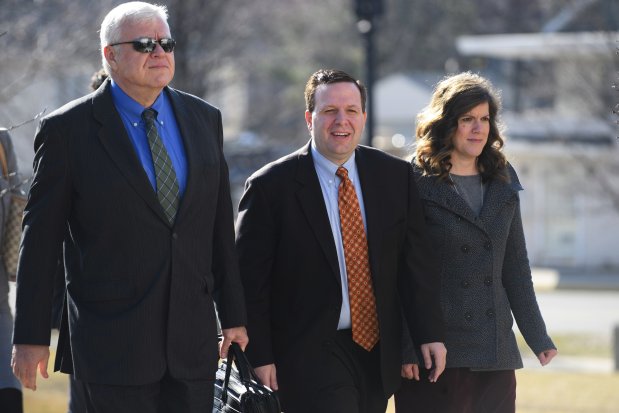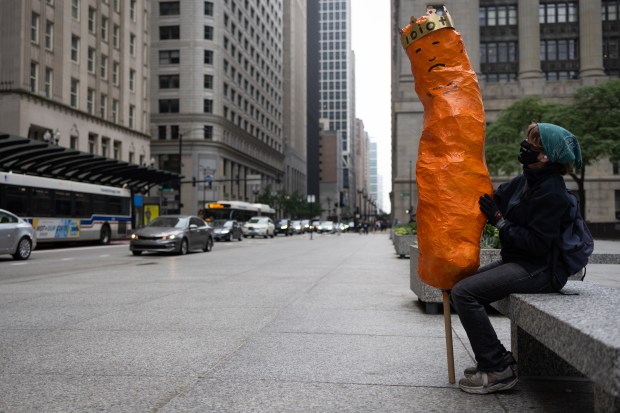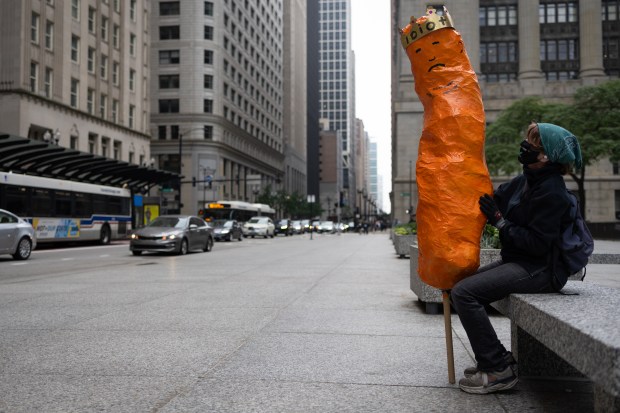Former Portage Mayor James Snyder waived attorney-client privilege and requested the court to unseal the transcript of his former lawyer Thomas Kirsch.
In the transcript, which the court granted release on Thursday, Kirsch testified about the initial days of the investigation into Snyder, who is scheduled to go to trial for a third time in U.S. District Court in Hammond on a bribery charge involving a $13,000 payment for a garbage truck contract.
Kirsch testified May 30, 2018, when he was a U.S. Attorney for the Northern District of Indiana. Kirsch, who at the time was a partner at Winston & Strawn, testified that Snyder called him either the day of or the next day after the FBI interviewed him in July 2014.
Snyder told Kirsch that the FBI asked him about his finances, specifically campaign finances, taxes and a trip to Vienna, Austria.
In November 2014, Kirsch said he met with two people from the U.S. Attorney’s Office and they discussed four topics: campaign finance reports, Great Lakes Peterbilt, a trip to Vienna, Austria, and Snyder’s relationship with a real estate agent.
In regards to campaign finance reports, Kirsch said Snyder worked to organize his finances in a “useful format.” Kirsch said they worked to organize them as personal, business or campaign finances.
“Some people are very good at keeping a checkbook and balancing and some people are bad at it. James Snyder was bad at it. So his financial records including his campaign finance reports were in disarray, and they were not something I would be able to work from,” Kirsch said.
Snyder’s practices “were sloppy but were not criminal,” because he was charging campaign expenses to his personal and business accounts, and then reimbursing himself and his business accounts through his camping in an “ad hoc manner.”
Then, Kirsch said the U.S. Attorney’s Office brought up an issue with how Great Lakes Peterbilt won a bid for three garbage trucks in the fall, and then in January Snyder received a consulting contract with the company.
Kirsch said in September 2014 the government alleged that Great Lakes Peterbilt paid Snyder $10,000 in January and had been awarded certain garbage trucks. Kirsch learned that Great Lakes Peterbilt had been awarded the bid before the $10,000 payment and that it was the lowest, most-responsive bidder.
While Kirsch said he “was always concerned” that the bid specifications were “manipulated so that the desired company could be the most-responsible bidder,” when he asked Snyder about it Snyder told him they weren’t manipulated.
At the November meeting, the government erroneously thought the trucks didn’t have Cummins engines, but Kirsch later presented evidence, including photographs of the engines, to show they were Cummins.
Finally, Kirsch said a trip to Vienna, Austria, and his interactions with the real estate agent were brought up, but “taken off the table.”
As he left the November 2014 meeting, Kirsch said his takeaway was that the government was looking into campaign finance and Great Lakes Peterbilt.
In early 2016, Kirsch said he got an email from U.S. Attorney Jill Koster that stated, along the lines of, “as you may be aware, we have reached a turning point in the investigation.” Kirsch said he told Koster he had no idea what she was talking about.
“I hadn’t heard from them in a very long time. I thought maybe the investigation had been closed,” Kirsch said.
Kirsch said he met with the U.S. Attorneys in March 2016, and at that point, he believed campaign finance “was off the table” because he wasn’t asked about it.
After multiple twists, turns and delays since Snyder was indicted on Nov. 17, 2016, in U.S. District Court in Hammond on two bribery counts and one of obstructing the IRS, a jury found Snyder not guilty on a bribery count involving a towing contract and guilty on the other two counts.
The second bribery conviction, over allegations surrounding a $13,000 payment involving around $1 million in contracts for garbage trucks, stood after two trials, only to get overturned when the Supreme Court ruled that the payment was a gratuity, not a bribe, and criminalizing the payment put even routine campaign contributions at the risk of the federal government’s wrath.
Overturning Snyder’s conviction had a ripple effect on countless other cases, most notably prominent cases in Illinois, including the trial of ex-House Speaker Michael Madigan and the case of the “ComEd Four” who were convicted of a scheme to bribe him.
The high court’s June 26 decision determined, among other matters, that the payment to Snyder from the Buha brothers, owners of Great Lakes Peterbilt, was a gratuity because Snyder received the money, reportedly for consulting work, after the business got the garbage truck contracts and not before.
In a motion to release the Kirsch transcript, Andrea Gambino, Snyder’s attorney, argued the transcript should be unsealed to establish that prosecutors “did not present evidence to support a bribery theory to the original grand jury.”
“Mr. Snyder requires his former attorney’s testimony to aid in his challenge to the government’s on-going efforts a third time to re-try him without re-indicting the case, in violation of his double jeopardy protections,” Gambino wrote.
Federal prosecutors have described Snyder in their filing as “a thoroughly corrupt public official, twice convicted by a jury of his peers for receiving a $13,000 payoff,” and note there is “no sound legal basis” for a windfall dismissal because of an omission from jury instructions, which was one of the contentions of Snyder’s attorneys.
Snyder, a Republican, was first elected mayor in 2011 and reelected in 2015, a term cut short by his federal conviction in February 2019.
Snyder received a sentence of 21 months in prison for the bribery and IRS convictions and a year on supervised release from U.S. District Court Judge Matthew F. Kennelly of the Northern District of Illinois.
Still, Snyder successfully argued that the start of his sentence should be postponed until his bid to have the Supreme Court hear his case was complete.
akukulka@post-trib.com





